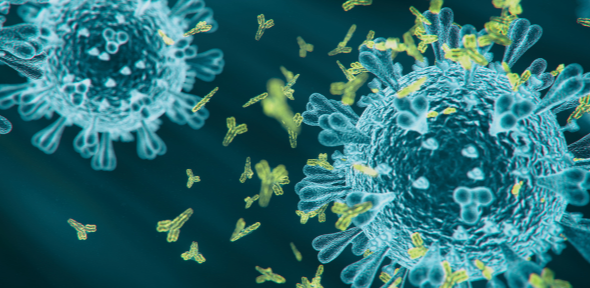
Submitted by Sophie Milbourne on Thu, 11/05/2023 - 16:03
The protection offered by COVID-19 vaccination declines more rapidly in people with severe obesity compared to those with normal weight, researchers from the MRC Toxicology Unit and collaborators within the Universities of Cambridge and Edinburgh have found. The study suggests that people with obesity are likely to need more frequent booster doses to maintain their immunity and have important implications for vaccine prioritisation policies around the world.
Clinical trials have shown that COVID-19 vaccines are highly effective at reducing symptoms, hospitalisation and deaths caused by the virus, including for people with obesity. Previous studies suggested that antibody levels may be lower in those with obesity and remain at higher risk of severe disease. The reasons for this, however, remained unclear.
Today's study, published in the journal Nature Medicine, reveals that people with severe obesity (a body mass index (BMI) of more than 40kg/m2) have similar levels of antibodies as those with normal weight six months after a second vaccine dose. However, the ability of those antibodies to work efficiently to fight against the virus is impaired in those with a higher BMI. When given a third (booster) dose of a COVID-19 vaccine, the ability of the antibodies to neutralise the virus and make it no longer harmful was restored in both groups. However, that immunity again declined more rapidly in people with severe obesity.
A team from the University of Edinburgh, led by Prof Sir Aziz Sheikh, looked at real-time data tracking the health of 3.5 million people in the Scottish population as part of the EAVE II study. They looked at hospitalisation and mortality from COVID-19 in adults who received two doses of Covid-19 vaccine (either Pfizer-BioNTech BNT162b2 mRNA or AstraZeneca ChAdOx1). Those with severe obesity had 76% risk of severe COVID-19 outcomes, compared to those with a normal BMI. ‘Break-through infections’ after the second vaccine dose also led to hospitalisation and death sooner (from 10 weeks) among people with severe obesity, and among people with obesity (after 15 weeks), than among individuals with normal weight (after 20 weeks). Despite being vaccinated, severely obese people are still more likely to experience these outcomes, which is why it is important to improve our understanding of the duration of protection from an immune response following vaccination in people with obesity.
The University of Cambridge team – jointly led by Dr James Thaventhiran, from the MRC Toxicology Unit and Prof Sadaf Farooqi from the Wellcome-MRC Institute of Metabolic Science – studied people with severe obesity attending Addenbrooke’s Hospital in Cambridge, and compared the number and function of immune cells in their blood to those of people of normal weight.
They studied people six months after their second vaccine dose and then looked at the response to a third 'booster' vaccine dose over time. The Cambridge researchers found that six months after a second vaccine dose, people with severe obesity had similar levels of antibodies to the COVID-19 virus as those with a normal weight.
But the ability of those antibodies to work efficiently to fight against the virus (known as ‘neutralisation capacity’) was reduced in people with obesity. 55% of individuals with severe obesity were found to have unquantifiable or undetectable ‘neutralising capacity’ compared to 12% of people with normal BMI.
“This study further emphasises that obesity alters the vaccine response and also impacts on the risk of infection,” said Dr Agatha van der Klaauw from the Wellcome-MRC Institute of Metabolic Science and first author of the paper. “We urgently need to understand how to restore immune function and minimise these health risks.”
The researchers found that antibodies produced by people with severe obesity were less effective at neutralising the SARS-CoV-2 virus, potentially because the antibodies were not able to bind to the virus with the same strength.
When given a third (booster) dose of a COVID-19 vaccine, the ability of the antibodies to neutralise the virus was restored in both the normal weight and severely obese groups. But the researchers found that immunity again declined more rapidly in people with severe obesity, putting them at greater risk of infection with time.
Dr James Thaventhiran, a Group Leader from the MRC Toxicology Unit in Cambridge and co-lead author of the SCORPIO study said: “It is promising to see that booster vaccines restore the effectiveness of antibodies for people with severe obesity, but it is concerning that their levels decrease more quickly, after just 15 weeks. This shows that the vaccines work as well in people with obesity, but the protection doesn’t last as long.”
Prof Sadaf Farooqi from the Wellcome-MRC Institute of Metabolic Science and co-lead author of the SCORPIO study said: “More frequent booster doses are likely to be needed to maintain protection against COVID-19 in people with obesity. Because of the high prevalence of obesity across the globe, this poses a major challenge for health services”.
'Accelerated waning of the humoral response to COVID-19 vaccines in obesity' was published on 11th May 2023 in the journal Nature Medicine. Read the full publication here.



